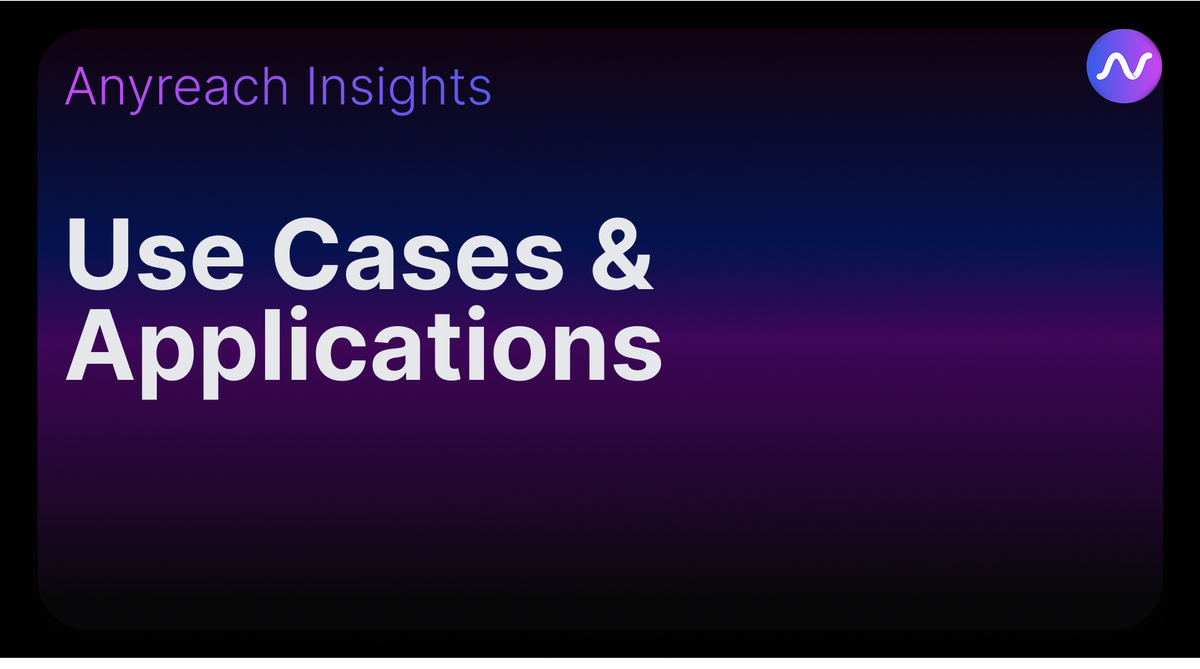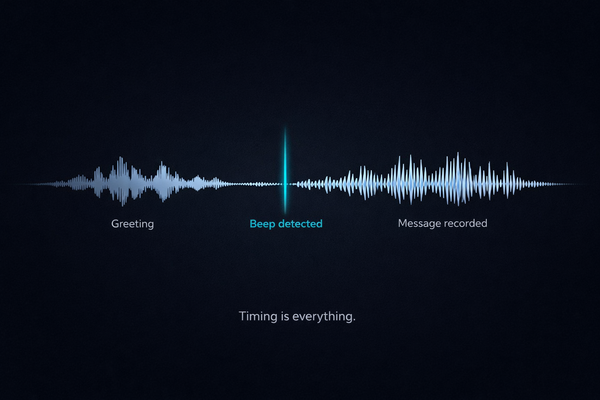How Enterprises Apply Agentic AI: Real-World Use Cases for Customer Support and Sales Automation

What is Agentic AI for Customer Support?
Agentic AI for customer support refers to autonomous AI systems that handle customer interactions across multiple channels without human intervention. These systems use advanced language models to understand context, resolve issues, and escalate complex cases when needed, operating 24/7 with consistent service quality.
Unlike traditional chatbots that follow rigid scripts, agentic AI adapts to each customer's unique situation. For enterprises, this means transforming customer support from a cost center into a competitive advantage. According to Gartner, organizations implementing agentic AI see 40% reduction in average handle time while maintaining or improving customer satisfaction scores.
The technology works by combining natural language processing with business logic and integration capabilities. When a customer reaches out via chat, voice, or SMS, the AI agent:
- Analyzes the inquiry using context from previous interactions
- Accesses relevant knowledge bases and systems
- Provides personalized responses or takes actions
- Seamlessly escalates to human agents when necessary
For BPOs managing multiple client accounts, agentic AI enables rapid deployment of specialized support agents. Each agent can be trained on specific product knowledge, compliance requirements, and brand voice, ensuring consistent service delivery across thousands of daily interactions.
How Does Omnichannel AI Automate Lead Qualification in BPOs?
Omnichannel AI automates lead qualification in BPOs by engaging prospects across email, SMS, voice, and chat channels simultaneously, scoring leads based on predefined criteria and behavioral signals. The system captures qualification data, updates CRM records in real-time, and routes qualified leads to appropriate sales teams without manual intervention.
Modern BPOs handle lead qualification for multiple clients, each with unique criteria and processes. Omnichannel AI addresses this complexity through configurable qualification frameworks. For instance, a BPO serving both B2B software companies and healthcare providers can deploy distinct AI agents that understand industry-specific qualification parameters.
The automation process typically follows this workflow:
| Stage | AI Action | Business Impact |
|---|---|---|
| Initial Contact | Engages via preferred channel | 3x higher response rates |
| Discovery | Asks qualifying questions naturally | 85% data capture accuracy |
| Scoring | Evaluates against criteria | 60% reduction in unqualified leads |
| Routing | Assigns to appropriate team | 25% faster follow-up time |
Deloitte research indicates that BPOs using omnichannel AI for lead qualification process 5x more leads with the same headcount, while improving qualification accuracy by 35%.
What Are Best Practices for Using Voice AI in Appointment Booking for Healthcare Services?
Best practices for voice AI in healthcare appointment booking include implementing HIPAA-compliant systems, training on medical terminology, providing clear verbal confirmations, offering human escalation options, and integrating with existing scheduling systems. Voice AI should handle routine bookings while recognizing when to transfer complex cases to human staff.
Healthcare organizations face unique challenges in appointment automation due to regulatory requirements and patient sensitivity. Successful implementations follow these proven practices:
1. Compliance and Security
- Use HIPAA-compliant voice AI platforms with end-to-end encryption
- Implement patient identity verification protocols
- Maintain audit logs for all interactions
- Regular security assessments and updates
2. Natural Conversation Design
Voice AI for healthcare must handle various accents, speech patterns, and medical terminology. Leading systems achieve 95% accuracy through:
- Training on diverse voice samples from target demographics
- Custom vocabulary for medical specialties
- Context-aware responses that adapt to patient needs
- Clear pronunciation of appointment details and confirmations
3. Integration Architecture
Seamless integration with existing systems ensures efficient operations:
- Real-time synchronization with EHR/EMR systems
- Calendar availability checks across providers
- Automated appointment reminders via preferred channels
- Insurance verification capabilities
McKinsey reports that healthcare providers using voice AI for appointment booking see 30% reduction in no-shows and 50% decrease in scheduling staff workload.
How Can SMS Automation Enhance Outreach in Recruiting for Education Sectors?
SMS automation enhances recruiting outreach in education by enabling personalized, timely communication with prospective students at scale. The technology automates application reminders, event invitations, deadline notifications, and FAQ responses while maintaining compliance with TCPA regulations and providing measurable engagement metrics.
Educational institutions face intense competition for qualified students. SMS automation provides a direct communication channel with 98% open rates, compared to 20% for email. Here's how leading institutions leverage this technology:
Targeted Campaign Strategies
- Application Journey Automation: Triggered messages guide prospects from initial interest through enrollment
- Event-Based Outreach: Automated invitations for campus tours, webinars, and information sessions
- Deadline Management: Timely reminders for application submissions, financial aid, and registration
- Personalized Follow-ups: Dynamic content based on program interest and engagement history
Implementation Framework
| Component | Function | Expected Outcome |
|---|---|---|
| Opt-in Management | Compliant subscriber acquisition | 40% opt-in rate from inquiries |
| Segmentation Engine | Target by program, location, stage | 3x higher engagement |
| Response Handling | AI-powered FAQ responses | 70% query resolution rate |
| Analytics Dashboard | Track engagement and conversion | 25% improvement in yield |
According to Education Advisory Board research, institutions using SMS automation see 35% higher application completion rates and 20% increase in enrollment yield.
What Role Does Chat Automation Play in IT Troubleshooting?
Chat automation in IT troubleshooting serves as the first line of support, instantly diagnosing common issues, guiding users through solutions, and collecting diagnostic information for complex problems. It reduces ticket volume by 60-70% while providing 24/7 availability and consistent troubleshooting procedures across the organization.
Modern enterprises generate thousands of IT support requests daily, from password resets to software configuration issues. Chat automation transforms this challenge into an opportunity for improved service delivery and cost efficiency.
Automated Troubleshooting Capabilities
Advanced chat automation systems handle diverse IT issues through:
- Intelligent Diagnosis: Natural language processing to understand problem descriptions
- Guided Resolution: Step-by-step instructions with visual aids
- System Integration: Direct access to reset passwords, check system status, provision access
- Knowledge Base Search: Instant retrieval of relevant documentation
- Ticket Creation: Automatic escalation with full context for complex issues
Enterprise Implementation Benefits
Organizations deploying chat automation for IT support report significant improvements:
- Average resolution time reduced from 45 minutes to 5 minutes for common issues
- First-contact resolution rate increased to 75%
- IT staff productivity improved by 40% through focus on complex problems
- User satisfaction scores increased by 30% due to instant availability
Forrester research indicates that enterprises with mature chat automation capabilities save an average of $2.3 million annually in IT support costs while improving service quality.
How Does Sales Automation Transform Outreach Strategies?
Sales automation transforms outreach strategies by orchestrating multi-channel campaigns, personalizing communications at scale, tracking engagement in real-time, and optimizing follow-up timing. This technology enables sales teams to engage 10x more prospects while maintaining personalized interactions and improving conversion rates by 30-40%.
Traditional outreach methods limit sales teams to manual, time-consuming processes. Sales automation revolutionizes this approach through intelligent orchestration across channels:
Multi-Channel Campaign Orchestration
- Email Sequences: Personalized campaigns based on prospect behavior and preferences
- Social Media Integration: Automated LinkedIn outreach and engagement tracking
- Voice AI Calling: Scalable phone outreach with natural conversations
- SMS Follow-ups: Timely messages to maintain momentum
Intelligence-Driven Personalization
Modern sales automation platforms leverage AI to:
- Analyze prospect data from multiple sources
- Craft personalized messages based on industry, role, and interests
- Optimize send times for maximum engagement
- A/B test messaging variations automatically
- Predict optimal next actions based on response patterns
Measurable Business Impact
| Metric | Before Automation | After Automation |
|---|---|---|
| Prospects Reached/Rep/Day | 20-30 | 200-300 |
| Response Rate | 2-3% | 8-12% |
| Meeting Book Rate | 5% | 15-20% |
| Sales Cycle Length | 45 days | 32 days |
According to Salesforce research, companies using comprehensive sales automation see 14.5% increase in sales productivity and 12.2% reduction in marketing overhead.
What Makes Recruiting Automation Essential for Modern Talent Acquisition?
Recruiting automation is essential for modern talent acquisition because it enables organizations to engage candidates 24/7, screen applicants at scale, reduce time-to-hire by 50%, and improve candidate experience. The technology handles repetitive tasks while allowing recruiters to focus on relationship building and strategic hiring decisions.
The war for talent demands speed and personalization that manual processes cannot deliver. Recruiting automation addresses critical challenges:
Automated Candidate Engagement
- Initial Screening: AI-powered chatbots conduct preliminary assessments
- Interview Scheduling: Automated coordination eliminating back-and-forth emails
- Status Updates: Proactive communication throughout the hiring process
- FAQ Handling: Instant responses to common candidate questions
Scalable Screening Processes
For high-volume recruiting scenarios, automation enables:
- Processing 1000+ applications daily with consistent evaluation criteria
- Skills-based assessments integrated into the application flow
- Automated reference checking and background screening initiation
- Predictive analytics to identify best-fit candidates
Strategic Benefits for Organizations
LinkedIn Talent Solutions reports that companies using recruiting automation experience:
- 70% reduction in time spent on administrative tasks
- 2x improvement in quality of hire metrics
- 85% candidate satisfaction rate (vs. 45% for manual processes)
- 40% decrease in cost-per-hire
For BPOs managing recruitment for multiple clients, automation enables standardized processes while maintaining client-specific requirements and branding.
How Do Enterprises Implement Agentic AI Successfully?
Successful enterprise implementation of agentic AI requires a phased approach starting with pilot programs, clear success metrics, stakeholder buy-in, robust integration planning, and continuous optimization. Organizations typically see ROI within 3-6 months when following structured implementation methodologies that balance innovation with risk management.
Phase 1: Strategic Planning and Assessment (Weeks 1-4)
- Use Case Identification: Map high-impact, low-complexity processes for initial automation
- Technology Evaluation: Assess platforms based on integration capabilities, scalability, and security
- Stakeholder Alignment: Secure executive sponsorship and address team concerns
- Success Metrics Definition: Establish clear KPIs for pilot evaluation
Phase 2: Pilot Implementation (Weeks 5-12)
- Limited Deployment: Start with 1-2 use cases in controlled environment
- Integration Development: Connect with existing systems (CRM, ERP, communication platforms)
- Training and Optimization: Refine AI responses based on real interactions
- Performance Monitoring: Track metrics and gather user feedback
Phase 3: Scaling and Optimization (Months 4-6)
- Gradual Expansion: Roll out to additional use cases and departments
- Process Refinement: Optimize workflows based on pilot learnings
- Advanced Features: Implement sophisticated capabilities like predictive analytics
- ROI Measurement: Quantify business impact and plan further expansion
Critical Success Factors
| Factor | Description | Impact on Success |
|---|---|---|
| Change Management | Proactive communication and training | 3x higher adoption rates |
| Data Quality | Clean, structured data for AI training | 40% better accuracy |
| Integration Planning | Comprehensive API strategy | 50% faster deployment |
| Continuous Learning | Regular model updates and optimization | 25% monthly improvement |
Accenture research shows that enterprises following structured implementation approaches achieve 2.5x higher ROI compared to ad-hoc deployments.
Frequently Asked Questions
What's the difference between traditional automation and agentic AI?
Traditional automation follows predetermined rules and scripts, while agentic AI uses machine learning to understand context, make decisions, and adapt to new situations. Agentic AI can handle complex, nuanced interactions that would require human intervention in traditional systems, learning and improving from each interaction.
How long does it take to see ROI from agentic AI implementation?
Most enterprises see initial ROI within 3-6 months of implementation, with break-even typically occurring by month 4. High-volume use cases like customer support or lead qualification often show positive returns within 60-90 days. Full ROI realization, including efficiency gains and quality improvements, typically manifests within 12 months.
What are the main challenges in deploying omnichannel AI?
Key challenges include ensuring consistent experiences across channels, integrating with legacy systems, maintaining data synchronization, managing compliance requirements, and training AI models on channel-specific communication patterns. Success requires careful planning, phased implementation, and ongoing optimization based on performance data.
Can agentic AI handle complex, industry-specific processes?
Yes, modern agentic AI platforms can be trained on industry-specific knowledge, terminology, and processes. Through techniques like fine-tuning and retrieval-augmented generation, AI agents can handle complex scenarios in healthcare, finance, legal, and other specialized domains while maintaining compliance with industry regulations.
How do enterprises ensure data security with agentic AI?
Enterprise-grade agentic AI platforms implement multiple security layers including end-to-end encryption, role-based access controls, audit logging, and compliance certifications (SOC 2, HIPAA, GDPR). Data isolation ensures client information remains segregated, while regular security assessments and updates maintain protection against emerging threats.




![[AI Digest] Agents Coordinate Plan Deploy Scale](/content/images/size/w600/2025/07/Daily-AI-Digest.png)